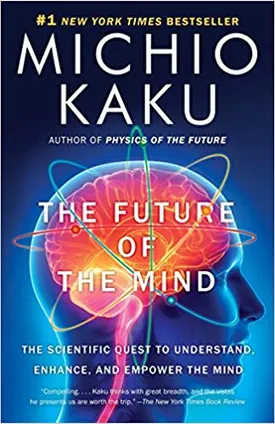The Future of the Mind: The Scientific Quest to Understand, Enhance, and Empower the Mind by Michio Kaku
The future of understanding the mind is something that fascinates and intrigues even the most hardened skeptic. Michio Kaku's book, The Future of the Mind: The Scientific Quest to Understand, Enhance and Empower the Mind, makes a convincing argument as to why we should welcome further exploration into human cognition and why these advancements could have a profound effect on how we live, as well as our capacity for knowledge and understanding.
Kaku's book addresses the groundbreaking ways in which neuroscience, biology and quantum physics will impact the future of understanding and even enhancing our cognitive abilities. He takes on a big field of research and breaks it down into what he calls “brain-machine interaction”, which is the idea of interfacing between the human brain and the technology we create.
Kaku begins his exploration by taking us through the history of neuroscience, from its discovery that neurons communicate with one another with electricity and chemical signals, to the present, in which researchers are making amazing advances using technology such as brain-imaging scanners like fMRI and PET to gain an even more detailed understanding of the brain’s inner workings. He discusses advances that have been made in areas such as artificial intelligence, robotics, virtual reality and more.
Kaku then transitions to what he calls the “mind-body realm”, whereby we can use the new tools made available to us to explore the effects of our thoughts and emotional states on our well-being. He discusses how scientists are studying the impact of positive and negative thought patterns on physical health and even our capacity for mental and emotional healing.
Kaku moves on to the potential of even further advancement in understanding the mind as we move into the world of neurology and quantum physics. He takes us through the groundbreaking potential of gene-editing technology, which could treat or even reverse neurological problems. We explore the possibilities of technologies such as brain implants, which could allow us enhanced abilities, or even a direct interface with technology.
Kaku then predicts the future of the mind, and how technology will enable us to not only diagnose and treat neurological issues, but even enhance our capacities for understanding things and our connection to the world around us. He also argues that this could provide us with new levels of insight, creativity and even spiritual connection with greater knowledge of our world and one another.
Overall, Kaku's book is an engaging exploration of the cutting-edge technologies and research methods which have the potential to open new doors and possibilities for understanding the mind. Kaku's writing is both comprehensible and compelling and his predictions for the future of the mind will both excite and ignite the reader’s imagination. Readers who are curious about the potential impact of advancing technologies on human cognition should not miss this book.

